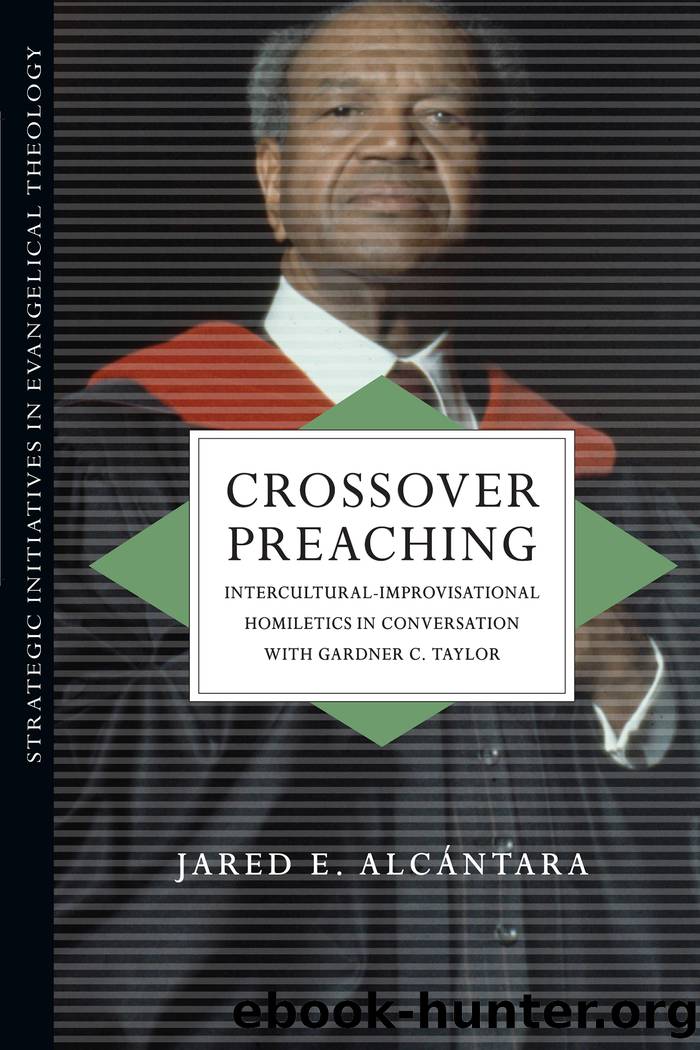Crossover Preaching by Alcántara Jared E.;Alcántara Jared E.;

Author:Alcántara, Jared E.;Alcántara, Jared E.; [Alcántara, Jared E.]
Language: deu
Format: epub
ISBN: 9780830899029
Publisher: InterVarsity Press
Published: 2015-10-02T00:00:00+00:00
LEAD: Interculturally Competent Strategies for Preaching and Teaching
Listen. The first interculturally competent strategy is to listen. One of the recurring themes in Taylorâs preaching and lecturing is that he calls preachers to careful, reflective listening. In his 1968 address âThe Power of Blackness,â delivered to the denominational leaders of the PNBC, Taylor exhorts his colleagues in ministry:
We who minister to people must listen carefully to hear what is being said, to catch the words of truth being uttered in the excessive rhetoric of violence of so many of our best young minds. Those of us who are thirty-five and over came forward in an integrationist generation. We are startled and sometimes angered by younger people as they talk about separatism. Much of this talk is angry, petulant, pointless. We need not abandon the dream of an integrated society, but we need to hear what is real in much current comment.94
In the Beecher Lectures, Taylor makes a more general charge to preachers, claiming that our task is to âto hear and suffer deeplyâ with suffering humanity, to âlisten and to identify the tread of the eternal Godâs sovereign purpose marching in the private and public affairs of men,â and âhearing that approaching, fateful footfall . . . to summon men and womenâ to do the work of God in the world.95
In his sermons, Taylor also explains how deep listening leads people back to God. He states: âListening ears can hear God in a little babyâs cry. . . . But so often we fail to see and hear.â96 In a different sermon, he focuses on Godâs presence within us, stating, âThere is a part of us we cannot understand, something within us, if only we would listen, that raises up our heads and lifts up our hearts.â97 In still another sermon, he describes the beautiful listening made possible for one who knows God intimately; one is able to âlisten to the songs the angels sing, and know still that there is more beyond.â98
Homiletics professors who practice careful listening know how to exercise respect and responsibility, and they encourage openness in the classroom. A homiletics professorâs willingness to listen is attitudinal; it involves an âorientation toward openness,â to use Hans-Georg Gadamerâs phrase: a pedagogical stance in which dialogue, mutuality, and humility shape oneâs convictions as an educator.99 An ability to listen to and participate in dialogue is predicated on oneâs orientation toward openness. Unless one is open, Gadamer says, meaningful dialogue is not possible.100 Moreover, openness is a key way to acquire knowledge and gain aptitude, the first two Aâs of the 3A Model of Intercultural Competence Proficiency.
In Teaching Community, bell hooks uses the phrase âradical opennessâ through listening to refer to the âwill to explore perspectives different than oneâs own and change oneâs mind as new information is presented.â101 Notice hooksâs verb choices: explore and change. The focus is not on who we are as teachers, but on who we are becoming as learners. In Teaching to Transgress, hooks contends that
Download
This site does not store any files on its server. We only index and link to content provided by other sites. Please contact the content providers to delete copyright contents if any and email us, we'll remove relevant links or contents immediately.
Joan of Arc by Mary Gordon(3271)
Victory over the Darkness by Neil T. Anderson(2390)
The Gnostic Gospels by Pagels Elaine(2034)
Devil, The by Almond Philip C(1906)
The Nativity by Geza Vermes(1853)
The Psychedelic Gospels: The Secret History of Hallucinogens in Christianity by Jerry B. Brown(1829)
Going Clear by Lawrence Wright(1574)
Going Clear: Scientology, Hollywood, and the Prison of Belief by Lawrence Wright(1574)
Barking to the Choir by Gregory Boyle(1509)
A TIME TO KEEP SILENCE by Patrick Leigh Fermor(1501)
Old Testament History by John H. Sailhamer(1499)
Augustine: Conversions to Confessions by Robin Lane Fox(1475)
A History of the Franks by Gregory of Tours(1402)
The Knights Templar by Sean Martin(1399)
A Prophet with Honor by William C. Martin(1376)
The Bible Doesn't Say That by Dr. Joel M. Hoffman(1374)
by Christianity & Islam(1351)
The Amish by Steven M. Nolt(1254)
The Time Traveler's Guide to Medieval England by Ian Mortimer(1219)
